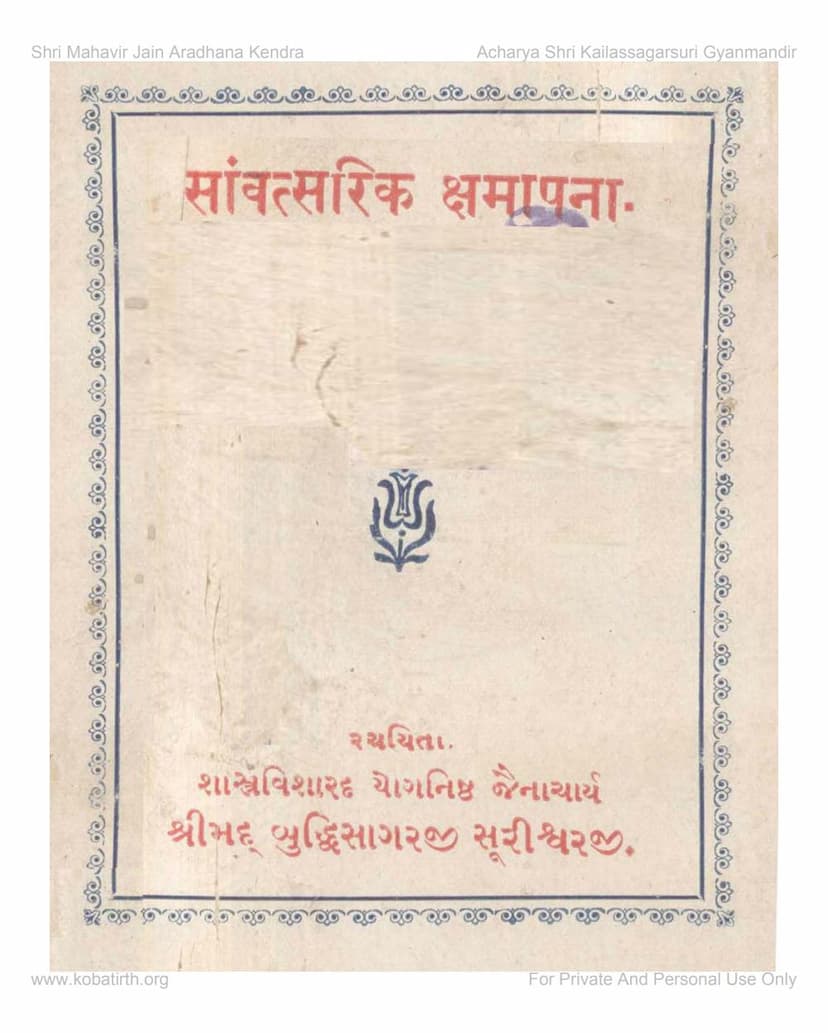Savantsari Kshamapana
Added to library: September 2, 2025

Summary
The book "Savantsari Kshamapana" (सांवत्सरिक क्षमापना) by Acharya Shri Buddhisagar Surishwarji is a Jain text focused on the concept of forgiveness, particularly within the context of the Savantsari (annual) ritual and the broader practice of seeking and granting forgiveness among all living beings.
Here's a comprehensive summary of the book based on the provided pages:
Core Theme:
The central theme of the book is Kshamapana (क्षमापना), which translates to forgiveness, asking for forgiveness, and granting forgiveness. It emphasizes the Jain principle of Ahimsa (non-violence) and extends it to the mental, verbal, and physical actions towards all living beings. The book aims to guide the reader towards a state of inner peace and purity through the practice of forgiveness.
Key Concepts and Teachings:
- Universal Brotherhood and Equality: The text repeatedly stresses that all living beings are fundamentally equal and alike in their essence, despite their diverse physical forms and experiences. The author urges readers to see all souls as their own, deserving of compassion and respect.
- Internal Purification through Forgiveness: The book explains that seeking and offering forgiveness is a powerful means of purifying the soul, freeing it from the bondage of negative emotions like anger, hatred, greed, and delusion. It's portrayed as a path to spiritual elevation.
- "Michchhami Dukkadam" (मिच्छामि दुक्कडं): This foundational Jain mantra for seeking forgiveness is explained and elaborated upon. The book delves into the true meaning and spirit behind this utterance, going beyond mere ritualistic repetition.
- Cause of Suffering: The text identifies ignorance, attachment, aversion, and the resulting negative actions (kashayas like anger, pride, deceit, and greed) as the root causes of suffering and the cycle of birth and death (samsara). Forgiveness is presented as a way to dismantle these negative patterns.
- The Nature of the Soul: The book emphasizes that the true nature of the soul is pure, omniscient, and blissful, but it is obscured by karmic impurities. Through practices like forgiveness and meditation, this inherent divine nature can be realized.
- Dravya and Bhava Kshamapana: The text distinguishes between outward or ritualistic forgiveness (Dravya Kshamapana) and internal, heartfelt forgiveness (Bhava Kshamapana). It highlights the importance of the latter for true spiritual progress.
- The Role of the Guru: The teachings are presented as emanating from the wisdom and guidance of the Acharya (spiritual master), who himself adheres to and promotes these principles.
- Metaphors and Analogies: The book uses various analogies, such as the oil in a lamp, the vastness of the ocean, and the relationship between the body and the soul, to explain complex spiritual concepts in a relatable manner.
- Practical Application: While deeply philosophical, the book also aims for practical application in daily life, encouraging readers to cultivate forgiveness in their interactions with family, friends, colleagues, and even adversaries.
- Ethical Conduct in Various Roles: The text discusses how to practice forgiveness and ethical conduct in different societal roles like kings, lawyers, businessmen, and servants.
- Discrimination between True and False Happiness: It differentiates between transient worldly pleasures and the eternal bliss of the soul, advocating for the pursuit of the latter through spiritual practices like meditation and forgiveness.
- Importance of Right View (Samyak Darshan) and Right Conduct (Samyak Charitra): The ultimate goal of forgiveness is to attain liberation (Moksha), which is achieved through the realization of the true nature of the soul and adherence to Jain principles.
Structure and Content:
The book is structured as a discourse and reflection on the practice of Savantsari Kshamapana. It includes:
- Introduction and Dedication: The early pages introduce the book, its author, publisher, and is dedicated to Seth Meghjibhai Hirjibhai, a Kutchhi Jain businessman, for his efforts in social reform.
- Author's Preface (Nivedan): This section highlights the significance of the topic and the author's approach to explaining the essence of Savantsari Kshamapana in a simple and beautiful style.
- Prologue for the Second Edition: It mentions the reprint due to the demand for the first edition and lists the individuals who supported the initial publication. It also emphasizes the importance of both material and spiritual forgiveness.
- The Main Discourse (Pages 18 onwards): This forms the core of the book, where the Acharya expounds on the principles of forgiveness, the nature of the soul, the interconnectedness of all beings, the eradication of negative emotions, and the path to spiritual liberation. It is rich in philosophical explanations and spiritual guidance.
- Dedications and Acknowledgements: The book thanks individuals and organizations that supported its publication.
- Catalog of Published Works: Several pages list other books published by the Adhyatma Gyan Prasarak Mandal, showcasing a wide range of spiritual and Jain literature.
- Numerous Verses and Prayers (Kavita, Doha, Kwaldi, Bhajan): Throughout the book, numerous poems, verses, and devotional songs are included to reinforce the message of forgiveness and devotion, making the teachings more accessible and impactful. These are often presented in Gujarati.
- Errata (Ashuddhi Shuddhi Patra): A section listing corrections for printing errors is included.
Overall Significance:
"Savantsari Kshamapana" is a profound and inspiring text that serves as a guide for Jains and seekers of spiritual truth to cultivate a life of forgiveness, compassion, and inner peace. It emphasizes that true happiness and liberation are found within oneself through the purification of the soul, and forgiveness is a vital tool in this journey. The book reflects the author's deep understanding of Jain philosophy and his commitment to spiritual upliftment.